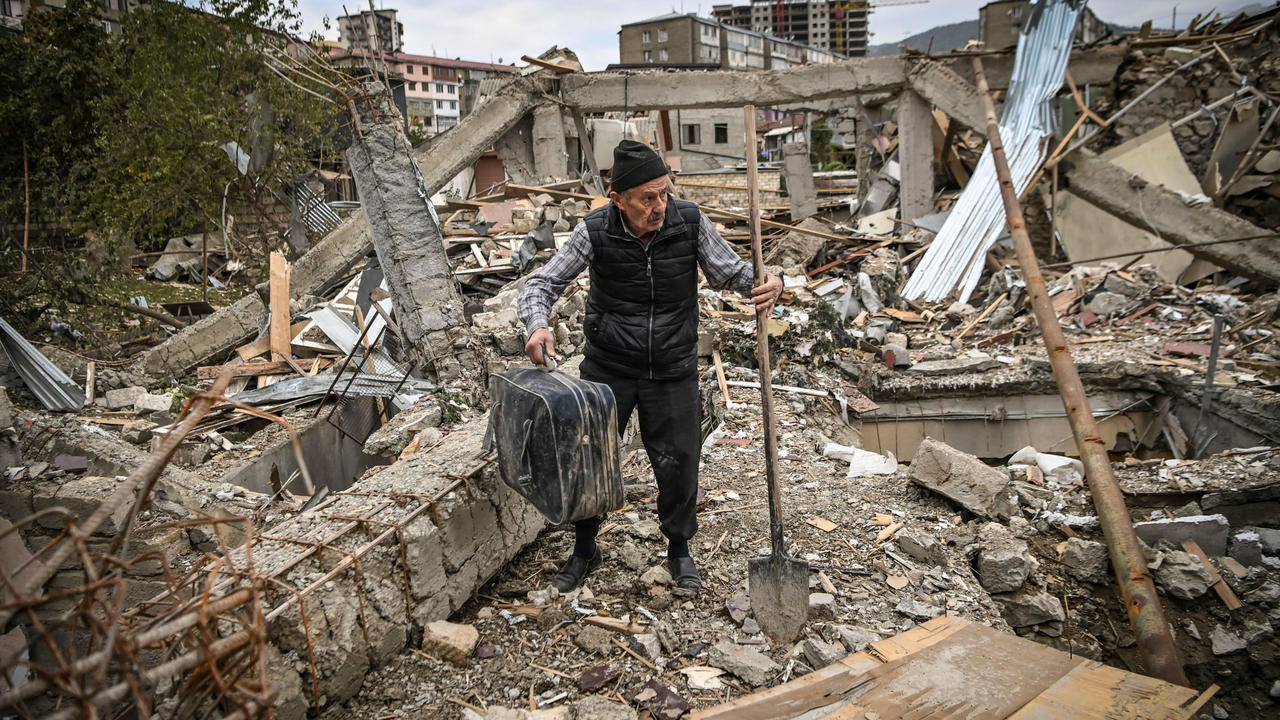Armenia accuses Azerbaijan of violating ceasefire hours after its announcement
ISTANBUL, Turkey (North Press) – On Sunday, Armenia announced that Azerbaijan had violated the “humanitarian truce” in the disputed Nagorno-Karabakh (Artsakh) region hours after it began.
“The enemy fired artillery shells in the northern and southern directions on Sunday night,” Armenian Defense Ministry spokeswoman Shushan Stepanyans posted on Twitter.
Artsakh is a mountainous region officially recognized as part of Azerbaijan, though it has a predominately Armenian population and is a de facto independent country which calls itself the Republic of Artsakh. It has been claimed by both Armenia and Azerbaijan since the establishing days of both countries.
A week after the announcement of an unimplemented ceasefire agreement between Azerbaijan and Armenia in Nagorno-Karabakh, a new “humanitarian truce” came into force on Saturday at midnight between the parties to end the escalation.
“The Republic of Armenia and the Republic of Azerbaijan have agreed to a humanitarian truce on October 18 at midnight local time,” the Armenian Foreign Ministry said.
The Azerbaijani Foreign Ministry confirmed the move in a similar statement.
The resumption of fighting three weeks ago has killed hundreds, and the conflict escalated again on Saturday following a failed ceasefire attempt a week ago sponsored by Moscow.
On Saturday, Azerbaijan threatened to avenge the killing of 13 civilians in a night bombing targeting the Azerbaijani city of Ganja, in a new escalation of the conflict.
The announcement of the truce followed Russian Foreign Minister Sergey Lavrov’s telephone conversation with his Armenian and Azerbaijani counterparts.
During the two conversations, Lavrov stressed the “need for strict adherence” to the ceasefire agreement signed in Moscow on Saturday.
On Saturday, French President Emmanuel Macron welcomed the “humanitarian truce” that followed “French mediation in recent days and hours in coordination with the two co-chairs of the Minsk Group.”
The Minsk Group was created in 1992 by France, Russia, and the United States in order to reach a peaceful resolution to the conflict between Armenia and Azerbaijan in Nagorno-Karabakh.
“The temporary ceasefire decision was adopted on the basis of the statement of heads of state of the OSCE Minsk Group on October 1,” the Azerbaijani Foreign Ministry said.
It was also adopted on the basis of statements by the co-chairs of the Minsk Group on the 5th of this month, and also in accordance with the Moscow Declaration on October 10.
There was no indication of any Turkish role in the agreement, the second of its kind, observers said.
“Deliberately marginalizing Turkey”
“The deliberate marginalization of the Turkish side is a clear message that it should not fuel the conflict in the Karabakh region and in Azerbaijan in general,” said Omar Huseyinoglu, a political analyst interested in international relations.
“This is another message to Turkey that it has no role in the solution there, especially after the threats and threatening tone it raised a few days ago,” Huseyinoglu said.
Turkish presidential spokesman Ibrahim Kalin said in remarks that Armenian shelling of the city of Ganja and other areas would not go unanswered.
This in itself, according to the political analyst, is a very harsh threat that does not indicate that Turkey wants to engage in dialogue.
He noted that Russia is dealing with the situation with a strategy and dynamism, unlike the Turkish side.
Turkey has confirmed that it continues to stand by Azerbaijan.
However, observers downplayed the significance of these statements, especially after the parties agreed on a ceasefire without Turkey having any role in it.
“Turkey is trying to send more political messages than on the ground to put pressure on Armenia,” Huseyinoglu said.
According to observers, Turkey is seeking to internationalize the conflict rather than convince the Azerbaijani side of the need for dialogue and non-escalation.
“Don’t mix the cards”
“Turkey has no interest other than to call for dialogue and not to mix the cards, which will increase its conflict with the Russians,” said Turkish researcher Abdulhamid Surkan.
“So far, Turkey has been dealing with the situation in Azerbaijan under the Joint Defense Agreements, so it is logistically supporting it and providing it with military support under those agreements,” Said Surkan.
Turkey and Azerbaijan have strong military ties dating back to the collapse of the Soviet Union, when former Soviet military officers began to supply Armenia with military equipment and training. “Turkey stepped in to stem the losses/defeats Azerbaijan was suffering with supplies and equipment, and after the war in the 1990s ended this became a formal military pact between the two states,” explained Aram Shabanian, who studies Non-Proliferation and Terrorism Studies at the Middlebury Institute of International Studies at Monterey and closely follows the conflict in Nagorno-Karabakh.
In the 1990s, the region was embroiled in a war that left 30,000 people dead. The fighting currently taking place is the most serious since the ceasefire declared in 1994.

